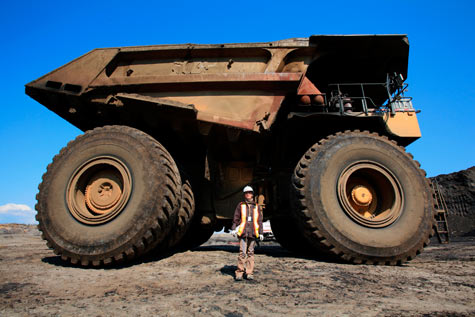
"I first came across the Alberta tar sands on assignment for WWF in 2007 and again in 2009 on several trips on behalf of Greenpeace. My first impression of the industry in northern Alberta was one of grandiose developments, in a negative sense of the word. Mining and energy extraction are never pretty, but the scale and pace at which big oil is operating in Canada is truly staggering. How could it be that Canada, widely regarded as a friendly, environmentally conscious and 'nice' country condones such destructive projects in its own backyard?
One answer I found whilst talking to people was cultural: whilst most Europeans, and indeed many peoples around the globe live with a notion of resource scarcity, Canadians apparently take the opposite approach: abundance. The mining pits, steam and upgrader plants north of Fort McMurray are truly gigantic, the impression of a stinking moonscape poisoned with toxic tailings and the sounds of cannons designed to scare off migratory birds apparent to anyone who ventures half an hour north along Highway 63. How on earth would anyone in their right mind condone this doomsday scenario?
Apparently, Canada has plenty of it all, and wasting an estimated 10% of its boreal forest, one of the last prime forests left on the planet, is not an issue. In my own cynical mind, this scene would have not surprised me if it had been in say Nigeria, Azerbaijan, Kazakstan, Bangladesh or any other place governed by big oil - I have seen similar sights in other parts of the world - but to witness this in the First World, where one would assume the existence of a functional society with a healthy respect for civil rights, for its environment and its people, was humbling.
You can take a view on the destruction of the land, the size and scale of things to come in the next decades - the projects already designed, approved and underway will occupy an area the size of Florida. However, the province of Alberta alone is roughly equivalent to the size of France: if you take off from Calgary, you'll fly for at least two hours before reaching Fort McMurray, the epicentre of oil development, and you're still in Alberta. To sacrifice a proportion of that for petrodollars, jobs and prosperity is an obvious and well-rehearsed choice seen the world over.
However, what got me most is the blatant disregard for the people living downstream from this deadly industry: Canada's First Nations. Gentle, soft-spoken, patient, suffering, yet by and large indecisive, they are the true losers here. Several communities living along Lake Athabasca have been ravaged by cancers unheard of before oil developments began on a large scale. Their water is not safe to drink; the numbers of fish, migratory birds, moose, bear and other wildlife have shrunk and are no longer safe to eat; their ancient way of life seems to be over for good. I find it hard to accept and reconcile this with the notion of the democratic, First World government that Canada claims to have - this scenario feels more at home in the darkest periods of colonization many of us have hoped were condemned to a chapter in the history books.
I hope that the images I present will give you a notion of how alive that history still is today."
- Jiri Rezac, July 2010
View the magazine photo feature.
© Jiri Rezac
